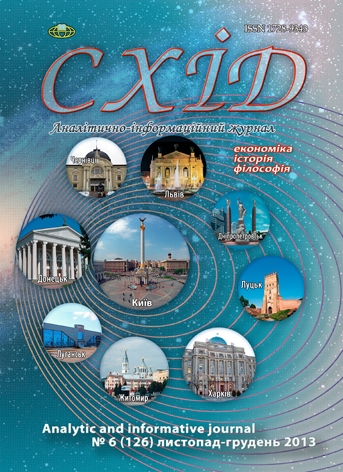Augustinian version of the law - the European search legitimizing individual
DOI:
https://doi.org/10.21847/1728-9343.2013.6(126).20783Keywords:
law, the universality, truth, legitimacy, sovereigntyAbstract
The article describes the representation of St. Augustine's spirit and theological-historical implications of the law, its positive impact on the legitimization of European identity.
Theologian distinguishes three types of law: a temporary, natural and eternal law. The latter is an all-encompassing force that controls all the processes of creation. It is implemented through the story and disclosed in the cognitive capabilities of a person to understand its course. Person of the eternal law is also the Holy Letter. It directs the faithful to the divine essence and enables the implementation of the covenants of Christ - to search for individual mutual society. Realization of the Divine precepts creates two social practices: the legalization of individual and corporate rights of the defense of honor and collective property, as well as claims libertalny principle of law.
Natural law comes from the eternal law, and there is a perfect synthesis of normal human relationships and the general laws of nature. Its key provisions are security and the continuation of life of the human race. Precept of natural law is the pursuit of a free implementation of the transcendent and the immanent levels of human existence. And at the same time the desire of people to be a single entity - to reach a general agreement (concordia), the order of love with all the elements of social life. Klyuchnym for achieving concordia is understanding people in the language that gives everyone in the communication process with the "neighbors" to reveal their natural essence and develop common criteria for the fair.
Temporary law is a combination of the laws of the state and social control in the form of folk traditions and customs. It forms a unique socio-politic about individual people and determines its development. For Augustine, the temporary law is conscious norm overseas social elements of individual and corporate desires that can destroy people reached concordia. However, Augustine's interpretation of the law did not eliminate the temporary rule of the eternal law in the soul of man - his conscience and the right of free solutions. The human soul is a divine archetype, and therefore the individual acquires the status of an autonomous artist eternal and natural law.
Thus, the Augustinian doctrine of the law legitimizes the human right to self-affirmation, the autonomic harmonization of all three levels of law. This aspect of the teaching of St. Augustine become the basis for the approval of the European individualism.
Downloads
References
Ортега-и-Гассет Х. Разум и вера в сознании европейского Средневековья / Х. Ортега-и-Гассет // Человек. - 1992. - № 2. - С. 81-89.
Августин Блаженный. Энхиридион, или о вере, надежде и любви / Августин Блаженный. - К. : "УЦИММ-ПРЕСС" - "ИСА", 1996. - 413 с.
Stone J. Human law and human justice / J. Stone. - Stanford University Press, 1965. - 415 p.
Суини М. Лекции по средневековой философии. Выпуск 1: Средневековая христианская философия Запада / Майкл Суини. - М. : Греко-латинский кабинет Ю. А. Шичалина, 2001. - 304 с.
Августин Блаженный. О граде Божием / Блаженный Августин. - Мн. : Харвест, М. : АСТ, 2000. - 1296 с.
Гьофе О. Розум і право. Складові інтеркультурного правового дискурсу / Отфрід Гьофе ; [пер. з нім. Л. А. Ситниченко, М. Д. Култаєвої]. - К. : Альтерпрес, 2003. - 264 с.
Рабинович В. Л. Исповедь книгочея, который учил букве, а укреплял дух / Вадим Рабинович. - М. : Книга, 1991. - 496 с.
REFERENCES
Ortega-i-Gasset Kh. (1992), Reason and faith in the minds of the European Middle Ages, Chelovek [Man], № 2, pp. 81-89 (rus).
S. Aurelii Augustine (1996), Enkhiridion, or about faith, hope and love, Kiyev, 413 p. (rus).
Stone J. (1965), Human law and human justice, Stanford University Press, 415 p. (engl).
Suini M. (2001), Lectures on medieval philosophy. Issue 1: Medieval Christian philosophy of the West, Moscow, 304 p. (rus).
S. Aurelii Augustine (2000), O city of God, Moscow, 1296 p. (rus).
Otfried Hoffe (2003), Vernunft und Recht: Bausteine zu einem interkulturellen Rechtskurs, Alterpress, Kyiv, 264 p. (ukr).
Rabinovich V. L. (1991), Confession knigocheya, who taught the letter and spirit of the strengthened, Moscow, 496 p. (rus).
Downloads
Published
How to Cite
Issue
Section
License
Copyright (c) 2014 Oleh Turenko

This work is licensed under a Creative Commons Attribution-NonCommercial-NoDerivatives 4.0 International License.
1. Authors bear responsibility for the accuracy of facts, quotations, numbers and names used.
2. Manuscripts are not sent back.
3. The publisher does not always agree with the authors' opinion.
4. The authors reserve the right to authorship of the work and pass the first publication right of this work to the journal under the terms of a Creative Commons Attribution-NonCommercial-NoDerivatives 4.0 International License. This license allows others to distribute (copy) the published work for non-commercial purposes, provided there is mandatory attribution to its authors and a link to the first publication in our journal.
5. The authors have the right to conclude separate supplement agreements that relate to non-exclusive work distribution in the form in which it has been published by the journal (for example, to upload the work to the online storage of the journal or publish it as part of a monograph), provided that the reference to the first publication of the work in this journal is included.

